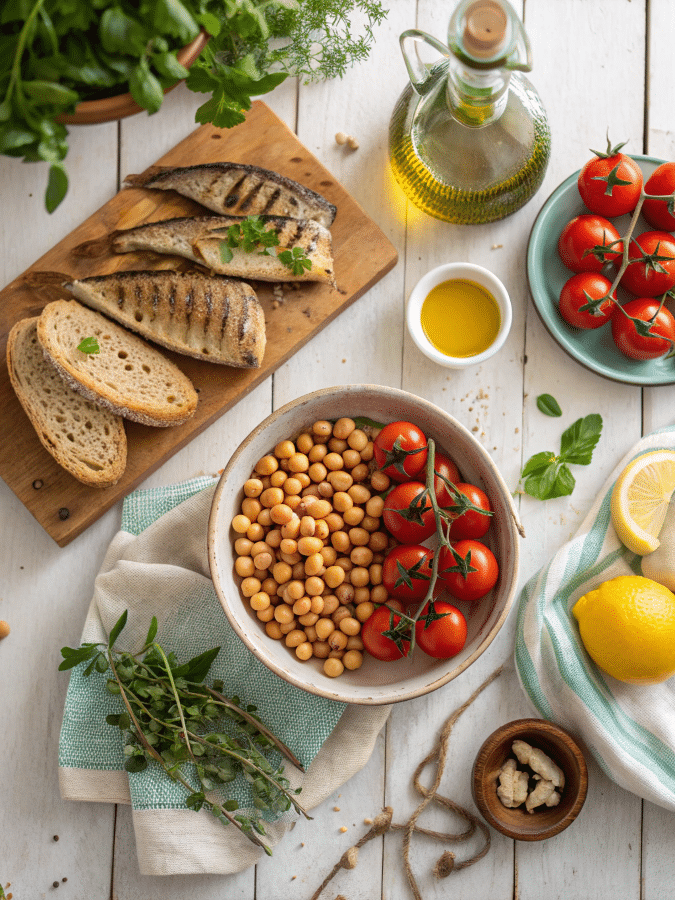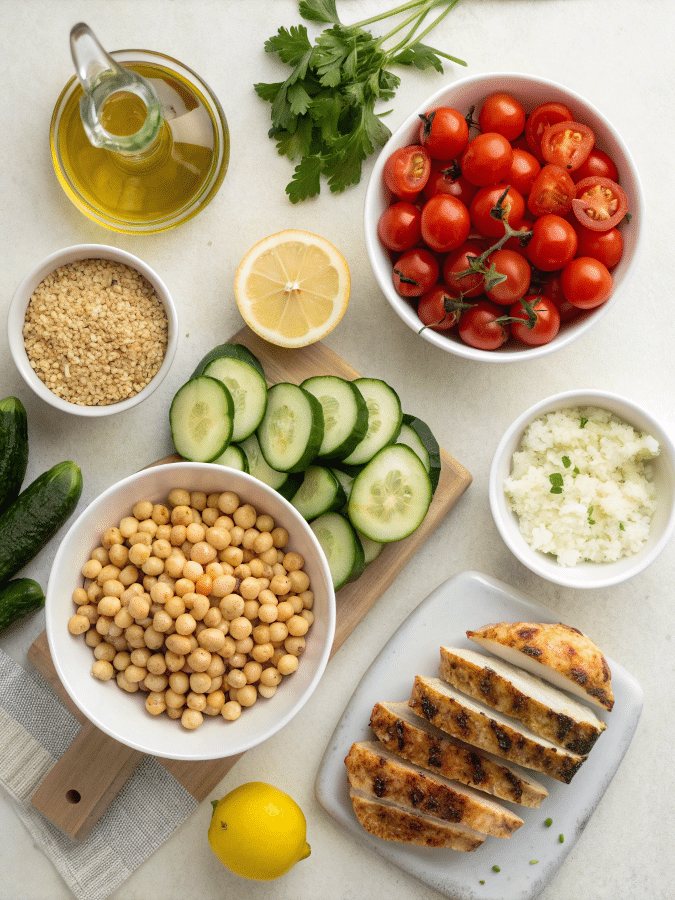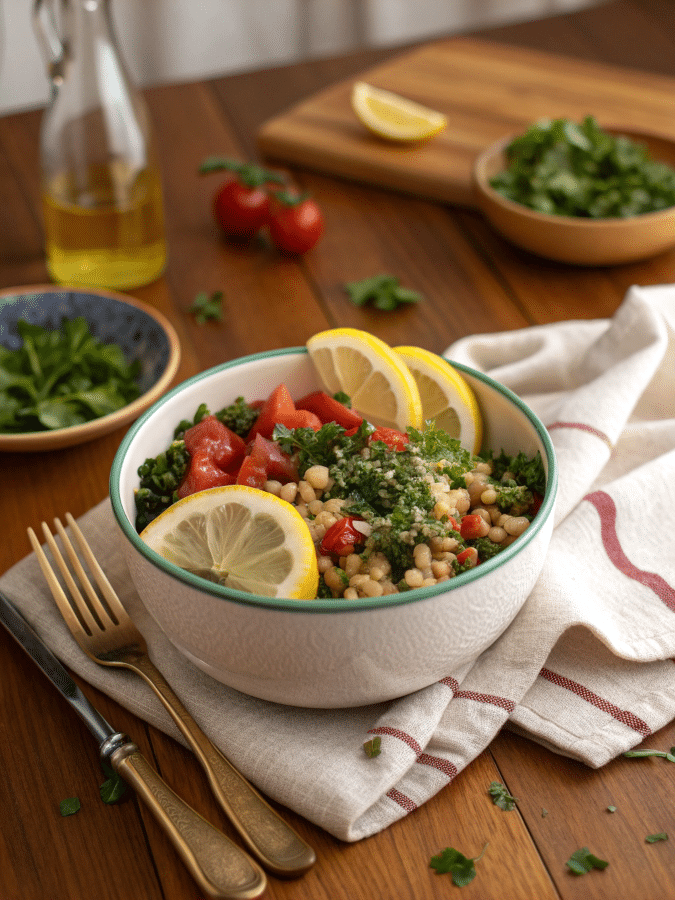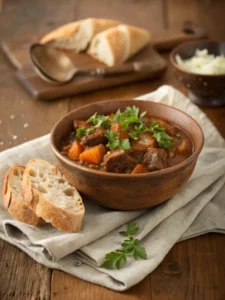
Mediterranean diet eating starts with simplicity, flavor, and fresh, wholesome foods. This lifestyle isn’t about strict rules, it’s about enjoying colorful vegetables, heart-healthy fats, lean proteins, and whole grains that naturally support your health. Whether you’re new to it or looking to get back on track, the Mediterranean diet makes healthy eating feel easy and satisfying, not restrictive.
In this Article
Key Takeaways: What You Need To Know
The Mediterranean diet is more than just a trend, it’s a lifestyle rooted in wholesome foods, joyful meals, and lasting health benefits. Backed by science, it’s consistently ranked as one of the healthiest ways to eat, helping people reduce inflammation, manage weight, and boost heart health. This guide walks you through the practical, flavorful, and inspiring aspects of living the Mediterranean way, from top foods and meal ideas to what to avoid. Let’s explore how this diet fits effortlessly into real life with easy recipes and clear answers to your top questions.
Mediterranean Diet Beginnings – Why This Way of Eating Just Works
From an Empty Pantry to the Mediterranean Table
Hi, I’m Deen, welcome to my kitchen. My food journey started out of necessity, but what I found changed everything. In my twenties, I faced burnout, long hours, and a fridge stocked with nothing but takeout leftovers. One night, I stumbled on a Mediterranean chickpea salad recipe. It was fresh, simple, and surprisingly comforting. That meal was my turning point, and I’ve been drawn to the Mediterranean diet ever since.
What makes the Mediterranean diet so powerful is how naturally it fits into everyday life. It doesn’t feel like dieting. It feels like coming home. With ingredients like olive oil, tomatoes, herbs, and whole grains, meals become both nourishing and exciting. Even now, years later, I still whip up meals like this garlic butter chicken bites with creamy pasta when I need a dinner that comforts and satisfies.
Real Food, Real Life – What Sets the Mediterranean Diet Apart
Unlike restrictive meal plans, the Mediterranean diet emphasizes balance. There’s room for seasonal fruits, veggies, fish, and even the occasional glass of red wine. You’re not counting calories, you’re savoring flavors. The emphasis on real food means you’re nourishing your body while enjoying what’s on your plate.
Take dishes like this sticky miso salmon bowl recipe. With every bite, you’re getting heart-healthy fats and antioxidants without sacrificing taste. That’s the magic of the Mediterranean lifestyle, it fits seamlessly into busy schedules and brings back joy to everyday meals.
Whether you’re cooking for one or feeding a family, this way of eating proves that healthy doesn’t have to mean complicated.
Core Components of the Mediterranean Diet
Foundational Foods You’ll Love
At the heart of the Mediterranean diet are ingredients that nourish both body and soul. Think fresh vegetables like tomatoes, cucumbers, and leafy greens, often paired with olive oil, garlic, and a hint of lemon. Whole grains like farro, barley, and bulgur take center stage, replacing processed carbs with satisfying fiber and nutrients. Legumes such as chickpeas, lentils, and white beans show up in hearty salads, soups, and stews.
Seafood plays a starring role, especially fatty fish like salmon, sardines, and mackerel, rich in omega-3s and perfect for simple meals like this mounjaro recipe with 4 ingredients. Add in small portions of nuts, seeds, and fermented dairy like Greek yogurt or feta cheese, and you’ve got the foundation of a Mediterranean meal. Even herbs, basil, oregano, mint, and dill, add both flavor and nutritional value.
You can enjoy dishes like teriyaki chicken in a crock pot with just a few swaps, like brown rice instead of white or a drizzle of olive oil in place of sugary saucesc, to keep things aligned with Mediterranean principles.
More Than Ingredients – It’s a Mindset
The Mediterranean diet is about more than food, it’s about how you eat. Meals are enjoyed slowly, often with family or friends, and without screens or distractions. There’s a strong sense of community, which studies link to both mental and physical health benefits. This mindful approach to eating allows your body to tune into hunger and fullness naturally, making overeating less likely.
The goal isn’t perfection, it’s consistency. Start with one Mediterranean-style meal a day and let it grow from there. Soon, it becomes second nature: cooking with intention, savoring every bite, and feeling better along the way.
Mediterranean Diet and Inflammation – A Natural Approach to Healing

Why It’s Called an Anti-Inflammatory Powerhouse
One of the Mediterranean diet’s biggest benefits is its ability to fight chronic inflammation. Unlike processed Western diets high in added sugars, trans fats, and refined grains, the Mediterranean diet is full of anti-inflammatory compounds. These include omega-3 fatty acids from fish, antioxidants from fresh vegetables and fruits, and polyphenols from olive oil and herbs.
A 2023 NIH study confirmed that people following a Mediterranean eating pattern showed significantly lower levels of inflammatory markers like CRP (C-reactive protein) and IL-6【source: ncbi.nlm.nih.gov. This means less joint pain, reduced risk of cardiovascular disease, and improved brain health.
For those struggling with inflammation-related issues like arthritis, fatigue, or metabolic syndrome, switching to meals like this crock pot chicken fingers with a simple olive oil and lemon dressing can bring real, noticeable relief.
Foods like leafy greens, berries, garlic, and fatty fish work synergistically to calm your immune system and promote healing. And with options like the pink salt apple cider vinegar, you can elevate digestion and detox pathways even further, supporting gut health, another major player in inflammation.
Healing Meals for Long-Term Wellness
The Mediterranean diet isn’t a short-term fix, it’s a lifestyle designed for longevity. Eating this way can reduce reliance on medications and help manage chronic conditions naturally. For example, swapping processed meats for grilled salmon or choosing a lentil stew over takeout pizza helps your body reduce oxidative stress.
A meal plan rooted in this tradition doesn’t just remove what’s harmful, it adds what’s healing. By focusing on food quality, you improve how your body functions on every level, from cellular repair to immune regulation. The longer you follow the Mediterranean way, the more your body responds.
What to Avoid on a Mediterranean Diet and How to Make It Easy
Foods to Skip Without Feeling Deprived
The Mediterranean diet doesn’t require perfection, but it does steer you away from certain foods that disrupt health. First up? Refined grains like white bread, sugary cereals, and white pasta. These spike blood sugar levels and lack the fiber your body needs. Instead, reach for whole grain options like farro or whole wheat bread.
You’ll also want to minimize red meat, especially processed varieties like bacon, sausage, or deli meats. These are high in saturated fats and preservatives linked to inflammation and heart disease. Opt for lean proteins such as grilled chicken or fish. Recipes like crock pot steak bites are perfect when you want a satisfying protein dish without sacrificing your health goals.
Added sugars, especially from soda, candy, pastries, and packaged snacks, are another major “no” on the Mediterranean plan. They don’t just add empty calories; they actively work against your body’s anti-inflammatory response. Even popular condiments like ketchup and salad dressings often contain hidden sugars. That’s why fresh alternatives like lemon juice, tahini, or a splash of extra virgin olive oil are so widely used.
Simple Swaps to Make the Diet Stick
Making this way of eating part of your routine doesn’t have to be complicated. Start small by replacing one or two meals a week. Instead of breakfast cereal, try Greek yogurt with berries and nuts. For lunch, skip fast food and enjoy a quinoa salad with grilled vegetables.
Batch cooking helps, too. For example, prep a dish like garlic butter steak bites with potatoes early in the week, it can serve as lunch or dinner multiple times.
Also, always keep pantry staples like canned chickpeas, olive oil, canned tuna, and dried herbs on hand. That way, you’re never more than 15 minutes away from a healthy Mediterranean meal.
FAQs Answered
What are the top 10 foods on a Mediterranean diet?
The Mediterranean diet emphasizes whole, unprocessed foods that fuel your body. The top 10 staples include:
Extra virgin olive oil
Leafy greens
Tomatoes
Fatty fish like salmon
Whole grains (quinoa, farro)
Legumes (lentils, chickpeas)
Nuts and seeds
Garlic and fresh herbs
Yogurt and small amounts of cheese
Seasonal fruits like figs and berries
These ingredients form the base of any traditional Mediterranean diet meal plan, making your plate both flavorful and nutrient-dense.
What foods can you not eat in a Mediterranean diet?
The Mediterranean diet discourages processed and refined foods. This includes:
White bread and sugary cereals
Processed meats (bacon, sausage, deli cuts)
Soda, candy, and desserts with added sugars
Fast food or deep-fried items
These foods increase inflammation and contradict the heart-healthy focus of the Mediterranean diet. Choosing whole food alternatives ensures better energy and long-term health.
Are eggs eaten in a Mediterranean diet?
Yes, eggs are part of the Mediterranean diet but typically in moderation. They’re often eaten poached, boiled, or used in frittatas with vegetables. Two to four servings a week is common. Combined with greens and olive oil, eggs offer high-quality protein without compromising the Mediterranean diet’s plant-forward approach.
Is the Mediterranean diet anti-inflammatory?
Absolutely. The Mediterranean diet is one of the most studied anti-inflammatory eating patterns. Rich in antioxidants, omega-3s, and fiber, this diet reduces chronic inflammation, supporting better heart, brain, and joint health. It’s widely recommended by the National Institutes of Health and dietitians alike.
What is the difference between the DASH diet and the Mediterranean diet?
Both diets promote heart health, but the Mediterranean diet centers on olive oil, seafood, and traditional Mediterranean cuisine. The DASH diet, on the other hand, focuses on low sodium intake and limiting saturated fat to lower blood pressure. The Mediterranean diet is more flexible, emphasizing lifestyle and enjoyment.
Is cheese allowed on the Mediterranean diet?
Yes, cheese is allowed, especially traditional Mediterranean varieties like feta, goat cheese, and Parmigiano-Reggiano. The key is moderation. Small amounts add richness and calcium without overpowering the meal. Cheese in the Mediterranean diet complements vegetables, grains, or olives rather than being the main focus.
Is peanut butter allowed on a Mediterranean diet?
While not traditional, peanut butter can fit into a modern Mediterranean diet, especially if it’s natural and free from added sugar or hydrogenated oils. Almond butter or tahini are closer to traditional Mediterranean choices, but natural peanut butter is acceptable in moderation.
Are bananas ok on the Mediterranean diet?
Yes, bananas are a wholesome part of the Mediterranean diet. They’re rich in potassium and fiber, making them ideal as a snack or blended into smoothies. While berries and figs are more traditional, bananas provide quick, accessible energy and fit the overall philosophy.
Can I eat potatoes on a Mediterranean diet?
You can eat potatoes on the Mediterranean diet, especially small portions of boiled or roasted varieties. Sweet potatoes are a better option than fries or chips. Combine them with olive oil and herbs, like in Japanese pink salt and ice recipe, to stay in line with Mediterranean principles.
What is the best salad dressing for a Mediterranean diet?
The best dressings are simple and made from whole ingredients. A classic Mediterranean diet dressing might include extra virgin olive oil, lemon juice or vinegar, garlic, and fresh herbs. Avoid store-bought dressings that contain sugar or seed oils.
Is the Mayo Clinic diet similar to the Mediterranean diet?
Yes, the Mayo Clinic diet shares many similarities with the Mediterranean diet. Both emphasize plant-based foods, healthy fats, and lifestyle habits like physical activity and mindful eating. However, the Mediterranean diet has stronger cultural roots and encourages a wider variety of foods and social eating.
What is the best diet for inflammation?
Among all diets, the Mediterranean diet is consistently rated as the most effective anti-inflammatory choice. It reduces CRP levels, supports gut health, and improves blood flow. This is why medical professionals often recommend it to patients with chronic conditions like arthritis, diabetes, or autoimmune disorders.
Conclusion: Real Food, Real Results

The Mediterranean approach to eating isn’t about restrictions, it’s about rediscovery. Rediscovering how good fresh vegetables taste with a drizzle of olive oil. Rediscovering how food can heal, energize, and bring people together. It encourages a shift from processed meals to intentional, flavorful cooking that supports long-term health.
By starting with a few simple changes, like adding more legumes or choosing fish over red meat, you’re already on your way. The beauty of this lifestyle is in its flexibility, tradition, and how naturally it fits into your real, busy life. One meal at a time, it works.


